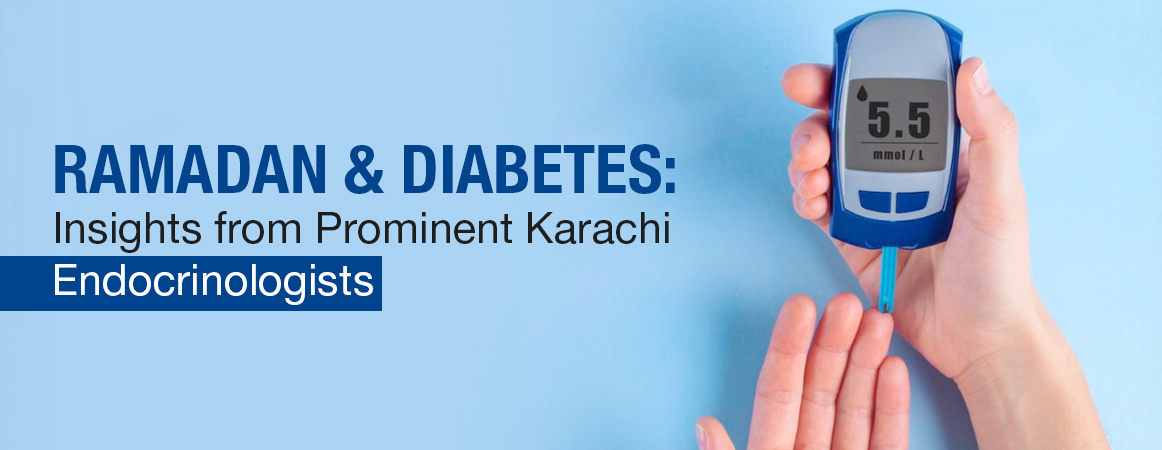Ramadan and Diabetes: Insights from Prominent Karachi Endocrinologists
Managing diabetes during Ramadan necessitates careful consideration and adherence to a personalized health strategy. Fasting from dawn to sunset can impact blood sugar levels, requiring individuals to consult a sugar specialist doctor. With proactive planning and expert guidance, individuals with diabetes can navigate the spiritual observance of Ramadan while maintaining optimal health and sugar levels as per the insights form the top endocrinologist in Karachi.
How Does Fasting Affect Blood Sugar Levels?
Fasting during Ramadan involves refraining from food and drink for a significant part of the day. For individuals with diabetes, this can disrupt their usual routine of meal planning and insulin management, potentially leading to fluctuations in blood sugar levels. It becomes crucial to comprehend how fasting impacts the body and devise strategies to manage diabetes effectively during this sacred month.
Consulting Diabetic Doctors in Karachi:
Before embarking on the fasting journey, it is imperative for individuals with diabetes to consult a sugar doctor. These specialists can provide personalized advice based on an individual’s health condition, ensuring a safe and healthy fasting experience. Seeking guidance from a sugar specialist doctor can help in creating a customized plan that aligns with both spiritual and medical needs.
Preparation and Planning:
Planning is key when managing diabetes during Ramadan. Begin by consulting with a sugar specialist doctor who can assess your current health status and provide tailored recommendations. Establishing a pre-Ramadan health check can identify any potential complications and allow for adjustments to medication or insulin dosages.
Diabetes and Suhur – The Pre-dawn Meal:
Suhur, the pre-dawn meal, plays a pivotal role in sustaining energy levels throughout the day. Diabetic individuals should focus on consuming complex carbohydrates, lean proteins, and healthy fats during Suhur to promote sustained energy release and avoid rapid blood sugar spikes. Consulting diabetic doctors in Karachi can provide insights into crafting a balanced Suhur that caters to individual health needs.
Hydration is Key:
As abstaining from water is an integral part of fasting, adequate hydration during non-fasting hours becomes crucial. Dehydration can exacerbate blood sugar imbalances, leading to complications for individuals with diabetes. It is essential to drink plenty of water during the permissible hours to maintain hydration levels. Diabetic doctors in Karachi emphasize the importance of monitoring hydration and adjusting fluid intake based on individual health requirements.
Diabetes and Iftar – Breaking the Fast:
For individuals with diabetes, it is essential to break the fast with a balanced meal that includes a mix of carbohydrates, proteins, and vegetables. Avoiding excessive consumption of sugary and fried foods can help in managing blood sugar levels. A sugar specialist doctor at Memon Medical Institute can provide specific recommendations for crafting a diabetes-friendly Iftar meal plan.
Regular Monitoring of Blood Sugar Levels:
Throughout Ramadan, consistent monitoring of blood sugar levels is vital for individuals with diabetes. Regular checks provide valuable insights into how the body is responding to fasting and help in making timely adjustments to medication or dietary choices. Diabetic doctors in Karachi recommend a proactive approach to blood sugar monitoring during this period.
Physical Activity and Exercise During Ramadan:
Maintaining a regular exercise routine is crucial for managing diabetes. While intense physical activity may not be suitable during fasting hours, incorporating light exercises during non-fasting periods can contribute to overall well-being. Consult with a sugar doctor to create a personalized exercise plan that aligns with the fasting schedule and health requirements.
Diabetes Treatment in Karachi:
MMI is dedicated to offering comprehensive diabetes treatment in Karachi. With a team of experienced and skilled diabetic doctors, MMI prioritizes personalized care to manage diabetes effectively. Our specialists conduct thorough assessments, providing tailored advice and treatment plans. From pre-Ramadan health checks to continuous monitoring and adjustments, MMI ensures a holistic approach.
The Takeaway:
- Consult diabetic doctors in Karachi for a pre-Ramadan health check and customized advice.
- Prioritize a balanced Suhur with complex carbohydrates and lean proteins.
- Stay hydrated during non-fasting hours to prevent complications.
- Break the fast with a well-rounded, diabetes-friendly Iftar meal, avoiding excessive sugars and fried foods.
- Consistently monitor blood sugar levels, making timely adjustments.
- Incorporate light exercises during non-fasting periods and seek guidance from healthcare professionals for a holistic approach.
Conclusion:
Observing Ramadan with diabetes requires meticulous planning and collaboration with healthcare professionals. Consulting diabetic doctors in Karachi, including a trusted sugar specialist doctor, ensures a holistic approach to managing health during this sacred month.


